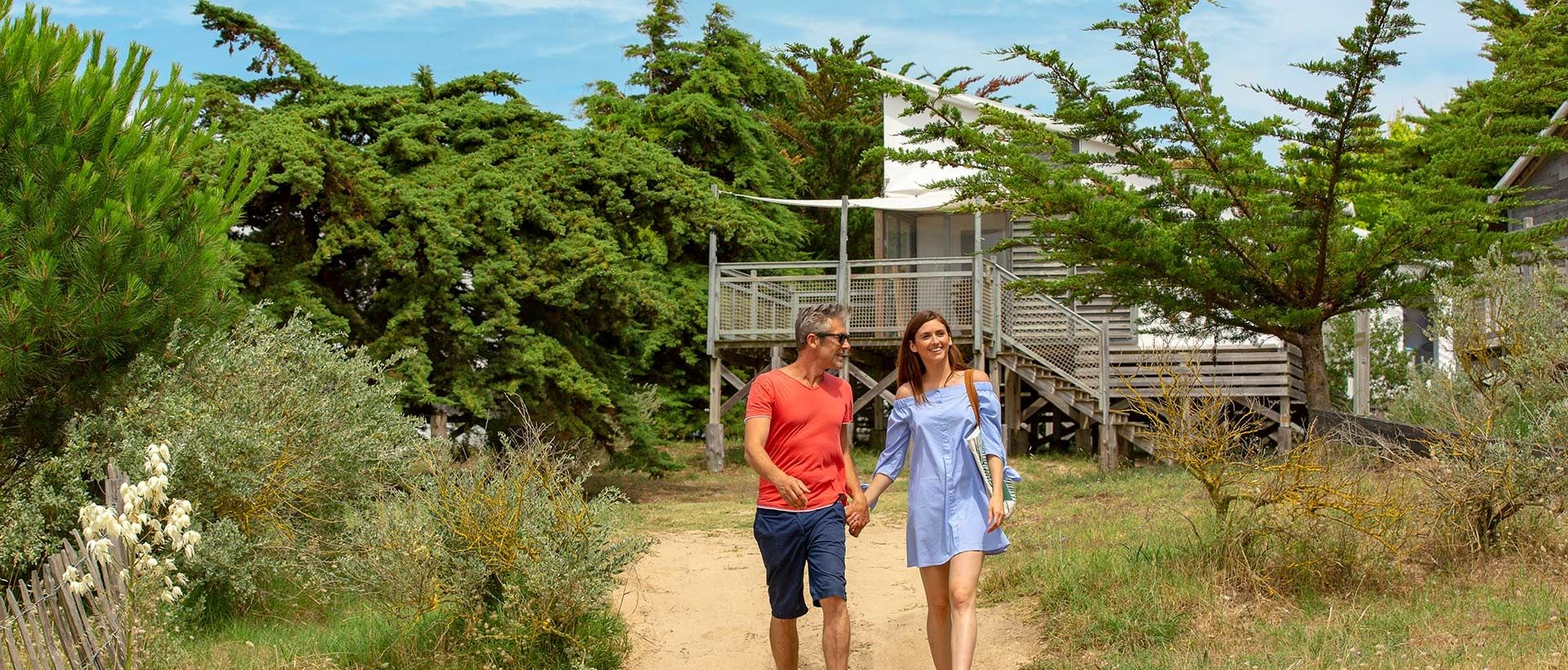For many people, camping means having the freedom to sleep right up close to nature, just where you want (or almost!). But sometimes it's hard to combine environmental awareness with campsite stays. Happily, more and more campsites are introducing eco-responsible commitments to protect the natural habitat in which they are located. How? We'll explain all you need to know about eco-campsites!

So what exactly is an eco-friendly campsite?
What’s an eco-friendly or eco-campsite? It’s a campsite where the operations and infrastructures are environmentally friendly. It is a response from the camping sector to ecotourism, ie. travelling while keeping one's environmental impact to a minimum. But what does eco-camping involve?
Eco-friendly accommodation
Within the tourism sector, looking after the environment has firstly to involve accommodation. Integration within the landscape, use of eco-friendly and/or recycled materials: from floor to ceiling, the accommodation of the future will be better for the planet, but that doesn't mean compromising on comfort. Nature is the winner here, and so are you!
This is what Sandaya group is putting forward through its quirky accommodation. What could be nicer for staying right up close to nature while keeping your environmental impact to a minimum than a stay in a tree-house or in a lodge tent?


Optimised resource management
Natural resources, especially water, which are both scarce and precious, lie at the heart of environmental concerns, and it is vital to do all we can to preserve them. Fitting ecological and economic devices and equipment such as flow restrictors and energy-saving keys are simple to install and above all very effective in the long term in the fight against waste.
Another pet topic is managing bio-waste on-site. To do so, composters and green waste shredders are effective devices that are being used by more and more campsites.
Protecting the environment must also include our means of locomotion! To do so, and to meet the huge increase in electric vehicle numbers, charging points are being installed in our Sandaya campsites.
So at Sandaya, we have implemented a number of measures, both at head office and in all our campsites, to offer an effective, long-term way to ensure the most efficient use of resources and reduce overall consumption: water, power, waste.
Promoting the biodiversity of natural spaces
Promoting and protecting biodiversity make up one of the cornerstones of ecotourism. To do so, limiting the use of chemical products is essential. The “Zero-phyto” objective is a response to this issue.
“Zero-phyto”? What’s that? It is the term used to refer to the maintenance of outdoor areas without the use of synthetic plant protection products.
Did you know that several of our campsites have adopted this process with wonderful results: our Blue Bayou campsite at Vendres Plage was awarded Écophyto funding for the Occitanie region.
Other projects also provide good means of protecting our environment, including partnerships and agreements with associations for the protection of our forests, and of biodiversity and its ecosystem. Among others, this applies to our Plein Air des Chênes, Blue Bayou, Les Vagues and Les Tamaris campsites, which have, for example, signed a partnership with the French League for the Protection of Birds (LPO). The expertise of associations is a major ally for defending the biodiversity of our lovely regions!


Colleagues who are both trained and committed
Combating climate change is impossible without all those involved in tourism acting in concert, and the first milestone is obviously training staff internally in workshops with regard to environmental issues.
Being responsible also means providing the best possible working environment for our employees to give of their best via CSR initiatives, which work in this direction, such as staff retention and team loyalty.
Finally, recognition and awards for campsites have a twofold benefit: they provide proof of commitment towards biodiversity and are a byword for quality, as they are awarded after thorough inspection by independent bodies.
Eco-responsible workshops with the family
Making people aware of environmental protection starts at a very young age! And there's no better way of doing so than learning while having fun in workshops and playing great games with the family!
And the very least one can say is that ideas are not in short supply:
● Building vegetable gardens and herb gardens as a means of finding out how the herbs, fruit and vegetables that we consume actually grow!
● Beehives, nest boxes and insect hotels are used for observing animals right up close, while protecting their natural habitats.
● Mini-farms for feeding the goats and other farm animals. It's all great fun and appeals as much to children as it does to adults!
Awareness-raising entertainment is as diverse as it is varied, so as to appeal to all age groups. Little campers will also have the opportunity to find it at the free children’s clubs!

And where does Sandaya fit in all this?
Feel inspired...











